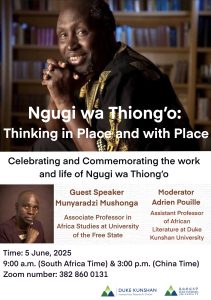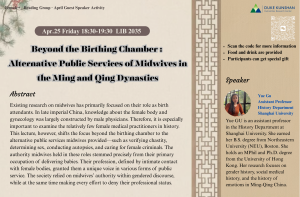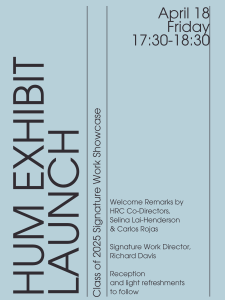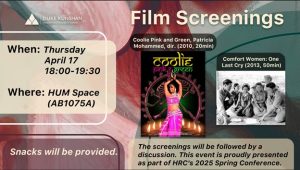Don’t Miss This Special Event: Honoring the Legacy of Ngũgĩ wa Thiong’o – June 5

We are excited to invite you to a powerful and thought-provoking event celebrating one of Africa’s greatest literary and intellectual figures—Ngũgĩ wa Thiong’o.
Ngũgĩ wa Thiong’o: Thinking in Plage and with Place
Celebrating and Commemorating the Work and Life of Ngũgĩ wa Thiong’o
Date: June 5, 2025
Time: 9:00 a.m. (South Africa) | 3:00 p.m. (China)
Zoom Meeting ID: 382 860 0131
Guest Speaker:
Dr. Munyaradzi Mushonga, Associate Professor in Africa Studies, University of the Free State
Moderator:
Dr. Adrien Pouille, Assistant Professor of African Literature, Duke Kunshan University
Join us as we reflect on Ngũgĩ’s remarkable contributions to literature, decolonial thought, and cultural identity. This event offers a rare opportunity to engage with global perspectives and honor a voice that has reshaped how we think about language, power, and place.
Harmony Lab Conference – “Confucianism, Family, and Women”

May 9 (Friday) 9:00-12:00 AB (Academic Building) 1087
Harmony Lab is holding its first conference on Friday, May 9, 2025, sharing a year-long project.
The Harmony Lab is a nexus of philosophical research undertaken by Duke University, Duke Kunshan University, and Wuhan University. It builds on and extends the Harmony Lab at Duke University’s Franklin Humanities Institute. Under the broad theme of harmony, our DKU project focuses on the subtheme of gender and family harmony. We have four Co-PIs, Profs Hwa Yeong Wang and James Miller from DKU and Profs. Yong Li and Qin Liu from Wuhan University.
Four of the co-PIs aim to investigate the role of Confucian philosophy, ethics, and values with respect to the changing gender norms and family structures that are emerging in contemporary East Asian societies. As the first step to achieve this aim, we explore having a nuanced understanding of how Confucians have historically understood family structures and how contemporary Confucian philosophers are paying attention to contemporary issues such as gender diversity and declining birth rates.
<Schedule>
Moderator: Halla KIM (Sogang University, Korea)
09:00-10:00 Opening
09:15-10:00 <Keynote Speech> Prof. Roger Ames (Peking University)
“Making Yourself at Home: The Familial Roots of Confucian Philosophy”
10:00-10:30 LI Yong (Wuhan University)
“Mainland Confucianism and the Ideal Family”
10:30-11:00 LIU Qin (Wuhan University)
“Differences, Roles, and Fluidity: Exploring the Feminist Potential of Neo-Confucianism”
11:00-11:30 Hwa Yeong WANG (Duke Kunshan University)
“Metaphysics, Ritual, and Gender: The Integrated System of Korean Neo-Confucianism and Its Feminist Challenges”
11:30-12:00 James MILLER and Sue WANG (Duke Kunshan University)
“A Comparative Investigation of the Confucian Philosophy of Family”
Nighthawks screening: Fantastic Mr. Fox (2009)
 When: Thursday May 1, 8:08 pm
When: Thursday May 1, 8:08 pm
Location: IB 1008
Nighthawks will screen Fantastic Mr. Fox by the American filmmaker Wes Anderson. Come see the adventures of Mr. Fox through a world of farms run by his human neighbors.
Snacks & light refreshments will be served!
DKU Film Society Presents: A Special Outdoor Screening of Metropolis (1927)

Step back in time to experience one of cinema’s most iconic films. Metropolis is a visionary sci-fi epic set in a dystopian city divided by class struggle, and its stunning imagery continues to influence filmmaking today. Watch it the way it was originally meant to be seen — outdoors, after dark, with a live, improvisational piano score performed by two talented pianists
We’re making it a full evening of fun and community:
– Buffet-style tea break before and during the screening
– Board games, card games, spikeball, and cornhole on the lawn
– Custom DKU Film Society blankets to keep you cozy (limited supply — first come, first serve)
Location: Lawn in front of CCTE
Date: Wednesday, April 23
Time: 19:00
~ Free and open to all ~
Come early, bring friends, enjoy food, games, and a timeless film experience under the stars ✨
Superdeep Nighthawks presents: Flow (2024)

Nighthawks will screen Flow (2024) by the Latvian director Gints Zilbalodis. Come to see the adventures of a cat as it navigates a world with drastically rising water levels.
When: 8:08 pm, Apr 24 (Thu)
Location: IB 1008
Light refreshments will be served!
The Life and Legacy of Pope Francis

When: Tuesday April 29, 12:00-1:30pm
Location: Performance Cafe
You are warmly invited to attend a panel discussion on the life and legacy of Pope Francis on Tuesday April 29, 2025, 12:00-1:30pm in the Performance Cafe. The panel will feature short presentations from DKU students and faculty reflecting on the personal, political, theological, and global impact of Pope Francis’s life and work.
Eco-Emancipation | Gaza’s Genocide/Ecocide, Technolibertarian Warfare, and the Seeds of Survival
 What does survival look like in the ruins of environmental devastation and militarized control? How can art and visual culture confront genocidal violence and offer radical hope?
What does survival look like in the ruins of environmental devastation and militarized control? How can art and visual culture confront genocidal violence and offer radical hope?
The Humanities Research Center at Duke Kunshan University is honored to host Professor T.J. Demos (History of Art and Visual Culture, UC Santa Cruz) for a timely and urgent lecture exploring the intersections of political violence, ecological destruction, and speculative futures.
Beyond the Birthing Chamber: Alternative Public Services of Midwives in the Ming and Qing Dynasties

Date: April 25, Friday
Time:6:30-7:30 pm
Location: LIB 2001
Speaker:
Yue GU is an assistant professor in the History Department at Shanghai University. She earned her B.S. degree from Northeastern University (NEU), Boston. She holds an MPhil and Ph.D. degree from the University of Hong Kong. Her research focuses on gender history, social medical history, and the history of emotions in Ming-Qing China.
Abstract:
Existing research on midwives has primarily focused on their role as birth attendants. In late imperial China, knowledge about the female body and gynecology was largely constructed by male physicians. Therefore, it is especially important to examine the relatively few female medical practitioners in history. This lecture, however, shifts the focus beyond the birthing chamber to the alternative public services midwives provided—such as verifying chastity, determining sex, conducting autopsies, and caring for female criminals. The authority midwives held in these roles stemmed precisely from their primary occupation of delivering babies. Their profession, defined by intimate contact with female bodies, granted them a unique voice in various forms of public service. The society relied on midwives’ authority within gendered discourse, while at the same time making every effort to deny their professional status.
HUM Exhibit Launch & Class of 2025 Signature Work Showcase

You’re Invited: HUM Exhibit Launch & Class of 2025 Signature Work Showcase
We are thrilled to invite you to the HUM Exhibit Launch, featuring the remarkable Signature Work projects of the Class of 2025.
Event Details:
- Date: Friday, April 18
- Time: 5:30 PM – 6:30 PM
- Location: HUM Space (AB1075A), Duke Kunshan University
Join us for an inspiring evening celebrating the creativity and dedication of our students. The event will commence with welcome remarks by Richard Davis, Signature Work Director, and Selina Lai-Henderson & Carlos Rojas, Co-Directors of the Humanities Research Center.
Following the showcase, enjoy a reception with light refreshments and an opportunity to engage with the featured students and faculty.
We look forward to seeing you there!
HRC 2025 Spring Conference Film Screening

Join us for an evening of thought-provoking film screenings at Duke Kunshan University’s Humanities Research Center!
When: Thursday, April 17, 18:00-19:30
Where: HUM Space (AB1075A)
We’ll be showcasing two impactful films: Coolie Pink and Green (2010, 20 mins), directed by Patricia Mohammed, and Comfort Women: One Last Cry (2013, 50 mins).
Enjoy the engaging films and snacks as part of the HRC’s 2025 Spring Conference.
Don’t miss out on this powerful evening—see you there!